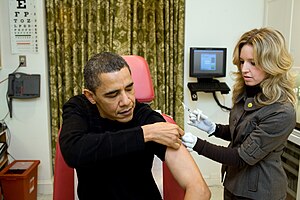AGING GRACEFULLY
I Don’t Want the Flu Shot!! — Really??
It is that time of year. Most medical professionals are encouraging their high risk patients to get the flu shot, but why are they doing so?
Every year in the United States, on average, 5%- 20% of the population gets the flu. More than 200,000 people are hospitalized from flu complications. People often are uncertain about whether to get the flu vaccine or not. Many people often have questions regarding the flu vaccine. What is the flu? Why should I get the vaccine? What is the flu vaccine? Here are some answers to commonly asked questions.
What is the flu?
The flu is a common viral infection that is spread from person to person in secretions from the nose and lungs. (For example, when sneezing.) The flu is a common respiratory infection that develops primarily in the lungs. As opposed to other respiratory infections,the flu usually causes higher temperatures, more malaise and body aches.
Why should I get vaccinated?
The flu is a serious, highly infectious respiratory infection. With other respiratory infections, the symptoms are usually mild and most people can continue working or going to school while ill. With the flu, the symptoms are severe and prolonged. The infection stresses the body and causes people to miss days of work or school. The flu can be treated with medications. However,the medications are expensive and are not as effective as the vaccine. They need to be started 24-48 hours after the symptoms begin.
Who should get vaccinated?
-People 65 or older.
-People living in nursing home or other long term care facilities.
-Adults and children 6 months or older with chronic lung or heart disease (including asthma)
-Adults and children 6 months and older who need regular medical care or were in a hospital during the previous year because of a metabolic disease (like diabetes), chronic kidney disease, or weakened immune system (including immune system problems caused by medicines or by infection with human immunodeficiency virus [HIV/AIDS].
-Women who will be pregnant during the flu season.
-All children from 6 -23 months of age.
-People who can transmit the flu to others. For example, healthcare workers, childcare workers, people in close contact with adults 65 or older
How long does it take for the vaccine to work?
The vaccine is effective 2 weeks after injection. The vaccine is only effective against the strains of the virus that match the vaccine. The strains vary from year to year. This is why it is important to be vaccinated each year! The flu season can begin in October and may last until May. October or November is the best time to receive the vaccine. However, it is still effective if administered earlier or later in the season.
What is the flu vaccine?
The flu vaccine is an inactivated vaccine, meaning that it contains killed influenza virus. The vaccine is injected into muscles and stimulates the immune system to produce an immune response (antibodies) to the flu virus. When the virus enters a person who has been vaccinated, the antibodies attack and kill the virus to prevent infection.
Each year the flu virus can change slightly, making the vaccine used in previous years ineffective. Every year, a new vaccine must be prepared that will be effective against the expected flu virus. The trick is to be able to predict which flu viruses are going to cause infection. The appropriate vaccine is then developed.
As required by the NYS Department of Health, I strongly encourage all my staff and residents to get the flu shot. This helps to keep everyone healthy. Over the years, I have seen a marked decrease in the incidence of the flu at the Farrar Home. I feel this is largely due to almost 100% of our population receiving the flu shot.
I Do Want the Flu Shot!! — Really!!
Submitted by Carol McKee, RN, Farrar Home Administrator







